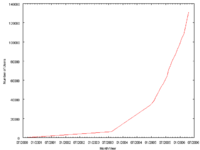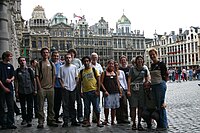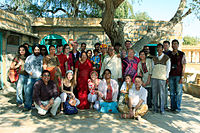
Back خدمة الضيافة Arabic Сетка гасціннасці Byelorussian Servei d'hospitalitat Catalan Gastfreundschaftsnetzwerk German Gastiga servo Esperanto Servicio de hospitalidad Spanish Vieraanvaraisuusjärjestö Finnish Réseaux d'échange d'hospitalité French Jaringan silaturahmi ID Rete di ospitalità Italian
| Part of a series on |
| Homestays |
|---|
| Hospitality exchange services |
| Hospitality for work |
| Hospitality for money |
| Home exchange and others |
| Part of a series on |
| Utopias |
|---|
 |
| Mythical and religious |
| Literature |
| Theory |
| Concepts |
| Practice |
|
Hospitality exchange services (hospitality exchange platforms, hospitality exchange networks or HospEx) are social networking services used for accommodation of travellers, where hosts do not receive payments.[1][2][3][4] The relationships on hospitality exchange services are shaped by altruism[5][6] and are related to the cyber-utopianism on the Web in its beginnings and to utopia in general.[7][8]
On HospEx, members typically create public profiles that describe themselves and their travel plans, and then searching for potential hosts or guests based on various criteria such as location, interests, and availability.[9] Travelers connect with local hosts who are willing to offer free accommodation, meals, and/or other forms of hospitality during their trip. The concept of hospitality exchange has been around for a long time, with informal networks of travelers and hosts existing for decades. However, the advent of the internet and social media has made it much easier to connect with people from all over the world, and hospitality exchange networks have become increasingly popular as a way for people to avoid commercial tourism and experience local cultures in a more authentic way.[10] These networks are usually non-profit, registered under .org-domains, built up by volunteers and use open-source software.[11]
 |
 |
 |
 |
- ^ Ikkala, Tapio; Lampinen, Airi (15 February 2014). "Defining the price of hospitality". Proceedings of the companion publication of the 17th ACM conference on Computer supported cooperative work & social computing. CSCW Companion '14. Association for Computing Machinery. pp. 173–176. doi:10.1145/2556420.2556506. ISBN 9781450325417. S2CID 39491376.
- ^ Spitz, Tara (2017). The commodification of hospitality An analysis of tourism encounters between interculturality and difference in regard to Turkish couchsurfing experiences (Graduate thesis). Kadir Has University.
- ^ Håvardsholm, Angelica Kolstad (June 2016). How does gender influence couchsurfers behaviour intentions based on trust and perceived risk? (Masters thesis). Universitetet i Stavanger. hdl:11250/2413810.
- ^ Ronzhyn, Alexander (2020). "Online identity: constructing interpersonal trust and openness through participating in hospitality social networks". The Journal of Education, Culture, and Society. 4 (1): 47–56. doi:10.15503/jecs20131.47.56. ISSN 2081-1640. S2CID 213038501.
- ^ Rosen, Devan; Lafontaine, Pascale Roy; Hendrickson, Blake (1 September 2011). "CouchSurfing: Belonging and trust in a globally cooperative online social network". New Media & Society. 13 (6): 981–998. doi:10.1177/1461444810390341. ISSN 1461-4448. S2CID 14552636.
- ^ "Value co-creation in Couchsurfing - the Indonesian host perspective". www.cabdirect.org. 2020.
- ^ Cite error: The named reference
cscommodificationwas invoked but never defined (see the help page). - ^ Latja, Piia (2010). Creative Travel - Study of Tourism from a socio-cultural point of view - The Case of CouchSurfing (Masters thesis). University of Tampere.
- ^ Lampinen, Airi M I (15 February 2014). "Account sharing in the context of networked hospitality exchange". Proceedings of the 17th ACM conference on Computer supported cooperative work & social computing. Association for Computing Machinery. pp. 499–504. doi:10.1145/2531602.2531665. ISBN 9781450325400. S2CID 20255816.
- ^ Molz, Jennie Germann (16 February 2012). "CouchSurfing and network hospitality: 'It's not just about the furniture'". Hospitality & Society. 1 (3): 215–225. doi:10.1386/hosp.1.3.215_2. ISSN 2042-7913.
- ^ Schöpf, Simon (25 January 2015). "The Commodification of the Couch: A Dialectical Analysis of Hospitality Exchange Platforms". TripleC: Communication, Capitalism & Critique. Open Access Journal for a Global Sustainable Information Society. 13 (1): 11–34. doi:10.31269/triplec.v13i1.480. ISSN 1726-670X.